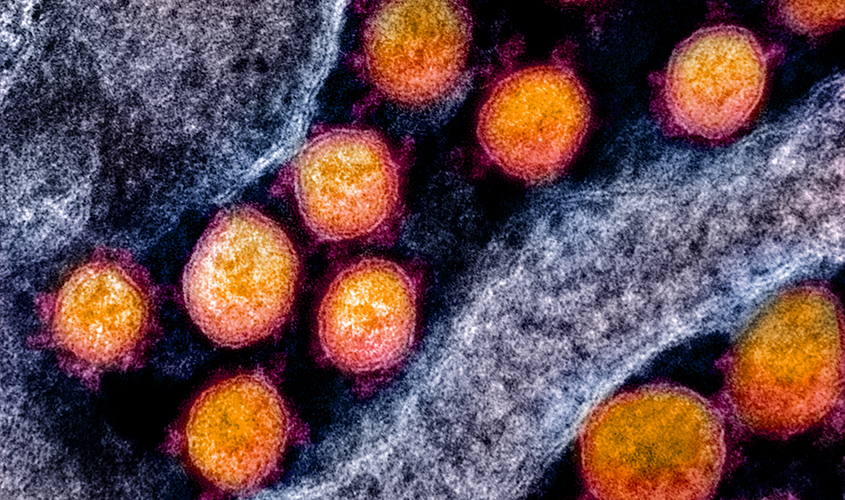
Dr. G. Richard Olds, president of St. George’s University, has committed his life to studying tropical and infectious diseases. All over the world, he has seen how viruses—these microscopic parasites that are invisible to the naked eye—can spread through a community, leaving damage in their wake.
One of the best methods to combat the virus is the use of vaccines. A version of the SARS-CoV-2 vaccine began being administered in Grenada last week, and a full program is currently being rolled out that places essential workers, elderly and Grenadian residents with pre-existing conditions on the priority list. Having long studied vaccines and their positive effect on healthcare, Dr. Olds is an ardent supporter of their implementation.
“I got my first COVID vaccine today,” he said.
Dr. Olds shed light on the vaccine that is currently being distributed in Grenada, what citizens can expect when receiving it, and the long-term outlook for COVID-19 in the country.
St. George’s University: What vaccine does Grenada currently have in stock? Is it being administered elsewhere in the world and how does it compare to other versions?
Dr. G. Richard Olds: Grenada is currently using the AstraZeneca vaccine, which is currently being used extensively in England. It was developed in partnership with Oxford University. In contrast to the two vaccines being used in the US, it is a chimpanzee adenovirus that has had the message for the spike protein placed within it. This vaccine can’t make humans sick, but it induces a high level of protection against COVID-2. Just like the mRNA vaccines used in the US, this vaccine requires two doses but has the advantage of being stored in cold but not freezing environments.
SGU: How exactly does this vaccine provide protection against SARS-CoV-2?
Dr. Olds: The COVID-2 virus attaches to human cells through a molecule on its surface called a spike protein. All current COVID vaccines target this molecule. Vaccinated people develop antibodies that block the binding of the spike protein to human cells. Unable to bind, the virus is unable to infect cells.
SGU: How long is the protection expected to last?
Dr. Olds: How long the vaccine will protect those who receive it is currently unknown, but it looks like all vaccines provide protection for at least a year and probably longer.
[av_testimonial_single src=’82687′ name=’G. Richard Olds, SGU President’ subtitle=” link=’http://’ linktext=” av_uid=’av-w4wg7v’]
“If everyone doesn’t take the vaccine, we run the risk that COVID will circulate for a very long time.”
[/av_testimonial_single]
[/av_testimonials]
SGU: Is the vaccine available in one shot or does it require multiple shots over a period of time?
Dr. Olds: Most of the seven COVID vaccines require two shots, but the Johnson and Johnson vaccine only needs one shot. This is not currently available in Grenada. The interval between the two shots varies, but about a month is the most common. There are experiments in England now with the AstraZeneca vaccine with longer periods between the shots.
SGU: How safe is the vaccine that is available in Grenada? Are there any side effects?
Dr. Olds: All the COVID vaccines appear very safe. In blinded control studies, no difference was seen between vaccinated people and those that got sugar water in terms of long-term side effects. In the short run, vaccinated people will likely feel soreness in their arm, feel poorly for a few days, and may have a low-grade fever. None of these responses are serious, and they often respond to over-the-counter medicine.
The AstraZeneca vaccine currently in Grenada does not seem to cause severe allergic reactions. All minor reactions to the vaccine appear more commonly in reaction to the second vaccine, and are a sign that they are working.
SGU: Are there any pre-existing conditions that would prevent someone from getting it?
Dr. Olds: If a person is severely immune compromised—such as being infected with the AIDS virus, on high-dose steroids, getting chemotherapy, or having an organ transplant—they should consult a doctor before getting the vaccine.
[av_button label=’Related news: New On-Campus Lab Strengthens Diagnostics, Education, and Research in Grenada’ icon_select=’no’ icon=’ue800′ font=’entypo-fontello’ link=’manually,https://www.sgu.edu/news-and-events/new-on-campus-lab-strengthens-diagnostics-education-and-research-in-grenada/’ link_target=” size=’large’ position=’center’ label_display=” title_attr=” color_options=’color_options_advanced’ color=’theme-color’ custom_bg=’#444444′ custom_font=’#ffffff’ btn_color_bg=’custom’ btn_custom_bg=’#ff6400′ btn_color_bg_hover=’custom’ btn_custom_bg_hover=’#0e0d44′ btn_color_font=’custom’ btn_custom_font=’#ffffff’ id=” custom_class=” av_uid=’av-regtbz’ admin_preview_bg=”]
SGU: Once an individual receives the vaccine, how will restrictions change for them?
Dr. Olds: Even after you get fully vaccinated, people will still need to wear a mask and socially distance until everyone on the island is vaccinated. That’s because vaccinated people are protected from dying from COVID, but they could still transmit the virus to others. Once everyone is vaccinated, life should return to normal.
SGU: Do you believe that all eligible individuals should receive the vaccine?
Dr. Olds: Everyone over 18 years of age should get the vaccine. Soon we will know if children over 12 should get the vaccine. The vaccine is very safe, and COVID can lead to serious illness or fatalities. In addition, COVID can cause long-term health issues for people. By now, millions of people in England have already received the vaccine currently available in Grenada without a problem.
If everyone doesn’t take the vaccine, we run the risk that COVID will circulate for a very long time, and the more the virus circulates, the greater the chance that a new variant will develop that the vaccine will not protect people from. It’s a race, and I hope this time humans win.